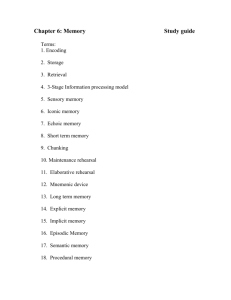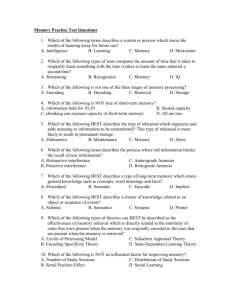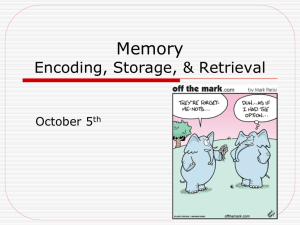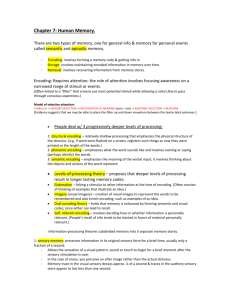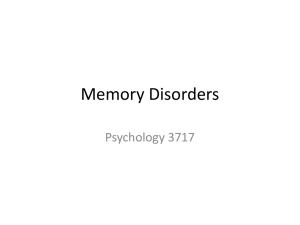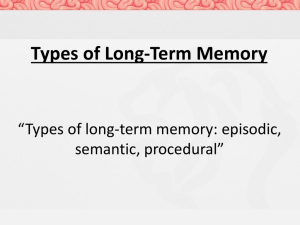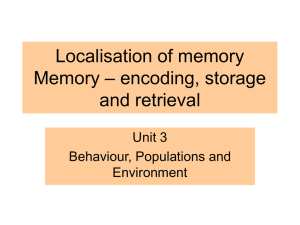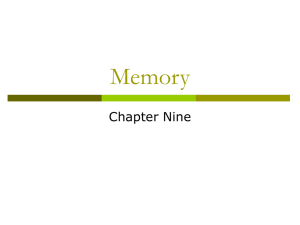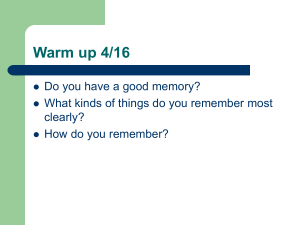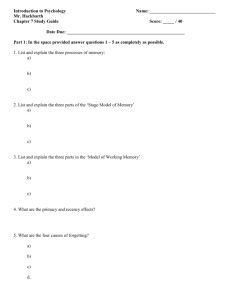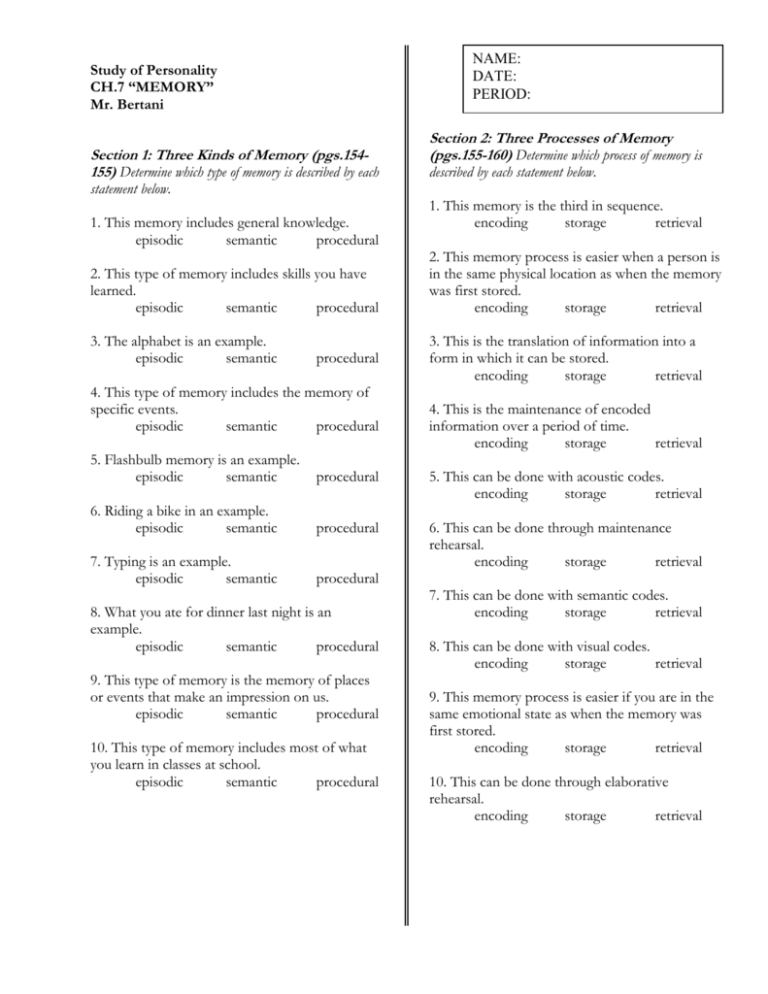
NAME:
DATE:
PERIOD:
Study of Personality
CH.7 “MEMORY”
Mr. Bertani
Section 1: Three Kinds of Memory (pgs.154155) Determine which type of memory is described by each
statement below.
1. This memory includes general knowledge.
episodic
semantic
procedural
2. This type of memory includes skills you have
learned.
episodic
semantic
procedural
3. The alphabet is an example.
episodic
semantic
procedural
4. This type of memory includes the memory of
specific events.
episodic
semantic
procedural
Section 2: Three Processes of Memory
(pgs.155-160) Determine which process of memory is
described by each statement below.
1. This memory is the third in sequence.
encoding
storage
retrieval
2. This memory process is easier when a person is
in the same physical location as when the memory
was first stored.
encoding
storage
retrieval
3. This is the translation of information into a
form in which it can be stored.
encoding
storage
retrieval
4. This is the maintenance of encoded
information over a period of time.
encoding
storage
retrieval
5. Flashbulb memory is an example.
episodic
semantic
procedural
5. This can be done with acoustic codes.
encoding
storage
retrieval
6. Riding a bike in an example.
episodic
semantic
procedural
7. Typing is an example.
episodic
semantic
6. This can be done through maintenance
rehearsal.
encoding
storage
retrieval
procedural
8. What you ate for dinner last night is an
example.
episodic
semantic
procedural
9. This type of memory is the memory of places
or events that make an impression on us.
episodic
semantic
procedural
10. This type of memory includes most of what
you learn in classes at school.
episodic
semantic
procedural
7. This can be done with semantic codes.
encoding
storage
retrieval
8. This can be done with visual codes.
encoding
storage
retrieval
9. This memory process is easier if you are in the
same emotional state as when the memory was
first stored.
encoding
storage
retrieval
10. This can be done through elaborative
rehearsal.
encoding
storage
retrieval
Section 3: Three Stages of Memory (pgs.160166) Fill in the word (or words) that best completes each
Section 4: Forgetting and Memory (pgs.167173) Write the best term in the space provided in
1. _____________________ consists of the
immediate, initial recording of information
that enters through our senses.
relearning
recall
recognition
forgetting
infantile amnesia
statement.
2. Icons are held in a sensory register called
____________________ memory.
3. The ability to remember visual stimuli over
long periods of time is called
_____________________ memory.
4. Mental traces of sounds, called echoes, are
held in a sensory register called
_____________________ memory.
5. If you pay attention to iconic and echoic
memories held ever so briefly in your sensory
register, you can transfer that information into
your ____________________ -term
memory.
front of its description.
mnemonic devices
retrograde amnesia
decay
repression
anterograde amnesia
1._________________________ the flip side of
memory
2._________________________ a memory task
that involves identifying objects or events that
have been encountered before
3._________________________ a memory task
that involves reconstructing something in your
mind
4._________________________ a memory task
that is easier to complete than learning something
new
6. The tendency to recall the initial items in a
series is called the
______________________ effect.
5._________________________ the fading away
of memory
7. The tendency to recall the last items in a series
is called the ____________________ effect.
6._________________________ the forgetting
of things on purpose without even knowing we
are doing it
8. _____________________ is the organization
of items into familiar or manageable units.
9. _____________________ occurs when new
information appears in short-term memory
and takes the place of what is already there.
10. The mental representations that we form of
the world by organizing bits of information
into knowledge are called
____________________.
7._________________________ the forgetting
of events that happened in the first one or two
years of a person's life
8._________________________ memory loss
from trauma that prevents a person from forming
new memories
9._________________________ loss of
memories in the period of time leading up to a
traumatic event
10._________________________ systems for
remembering information
Copyright © by Holt, Rinehart and Winston. All rights reserved.

